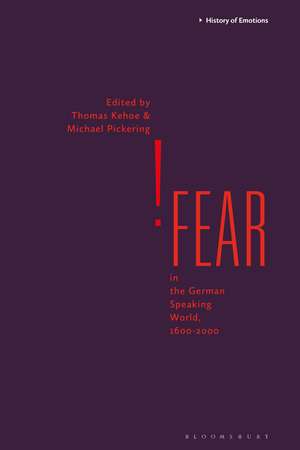Fear in the German-Speaking World, 1600-2000: History of Emotions
Editat de Thomas Kehoe, Michael Pickeringen Limba Engleză Hardback – 19 feb 2020
| Toate formatele și edițiile | Preț | Express |
|---|---|---|
| Paperback (1) | 219.46 lei 6-8 săpt. | |
| Bloomsbury Publishing – 25 aug 2021 | 219.46 lei 6-8 săpt. | |
| Hardback (1) | 600.06 lei 6-8 săpt. | |
| Bloomsbury Publishing – 19 feb 2020 | 600.06 lei 6-8 săpt. |
Preț: 600.06 lei
Preț vechi: 859.53 lei
-30% Nou
Puncte Express: 900
Preț estimativ în valută:
114.86€ • 124.80$ • 96.54£
114.86€ • 124.80$ • 96.54£
Carte tipărită la comandă
Livrare economică 21 aprilie-05 mai
Preluare comenzi: 021 569.72.76
Specificații
ISBN-13: 9781350150478
ISBN-10: 1350150479
Pagini: 312
Ilustrații: 14 bw illus
Dimensiuni: 156 x 234 mm
Greutate: 0.61 kg
Editura: Bloomsbury Publishing
Colecția Bloomsbury Academic
Seria History of Emotions
Locul publicării:London, United Kingdom
ISBN-10: 1350150479
Pagini: 312
Ilustrații: 14 bw illus
Dimensiuni: 156 x 234 mm
Greutate: 0.61 kg
Editura: Bloomsbury Publishing
Colecția Bloomsbury Academic
Seria History of Emotions
Locul publicării:London, United Kingdom
Caracteristici
Explores the role of fear in conjunction with the history of emotions to provide a detailed account of fear in the German speaking world across 1600-2000.
Notă biografică
Thomas Kehoe is a Research Fellow at the University of New England, Australia. A historian with a focus on Germany and the United States, he has published in journals such as Genocide Research, War in History and Journal of Interdisciplinary History. Michael Pickering is a Lecturer in History at Trinity College, University of Melbourne, Australia.
Cuprins
Introduction: Thomas Kehoe & Michael Pickering, (University of New England, Australia and University of Melbourne, Australia) 1. Political Fear during the Wars of Louis XIV: The Danger of Becoming French, Kirsten L. Cooper, (University of North Carolina at Chapel Hill, USA)2. Vampires, Ottomans, and the Spectre of Contagion: The Intersectionality of Fear on the Periphery of the Habsburg Monarchy, Michael Pickering (University of Melbourne, Australia) 3. "The forest is not everyone's friend:" Fear in an 18th century Southwest German Hometown, Dennis Frey, (Lasell College, USA)4. Gypsy Hysteria in 19th Century Germany: A Biopolitical Response, Charissa Kurda, (Flinders University, Australia) 5. Conceptualizing Gender and Fear: German-Jewish Masculinities in the Third Reich and the Dread of the Unknown, Sebastian Huebel, (University of British Columbia, Canada)6. Cultivating Fear: The Image of SA and the Presence of Propaganda in the Late Weimar, Jacob Berg & Richard Scully, (University of St. Andrews, UK and University of New England, Australia)7. Gangs in the Forest: The Construction of the Criminal Archetype in Post-World War II Germany, Thomas Kehoe (University of New England, Australia)8. German Angst After 1945 as Fear of the Fear, Pierre-Frédéric Weber, (University of Szczecin, Poland)9. Fear of Falling: Talking about (and Being Afraid of) Poverty in Germany since 1945, Christoph Lorke, (University of Münster, Germany)Conclusions: Michael Pickering & Thomas Kehoe (University of New England, Australia and University of Melbourne, Australia)
Recenzii
The authors knowledgeably explain the strengths and weaknesses of the ongoing research. Their courage to make independent judgments and their ability to draw up unfamiliar perspectives are convincing.
[F]or many readers reflecting on the contemporary moment, this volume will seem a timely meditation on the underlying causes of our political discontent.
Hugely ambitious, wide-ranging, and compelling account of the changing cultural meanings of fears and, most importantly, their impact on history.
This persuasive and carefully-constructed volume makes a strong affirmative case for the importance of fear, and of emotions more generally, in the study of German-speaking Central Europe. Broad in scope and chronology, these essays will appeal to readers interested German and European history.
[F]or many readers reflecting on the contemporary moment, this volume will seem a timely meditation on the underlying causes of our political discontent.
Hugely ambitious, wide-ranging, and compelling account of the changing cultural meanings of fears and, most importantly, their impact on history.
This persuasive and carefully-constructed volume makes a strong affirmative case for the importance of fear, and of emotions more generally, in the study of German-speaking Central Europe. Broad in scope and chronology, these essays will appeal to readers interested German and European history.












